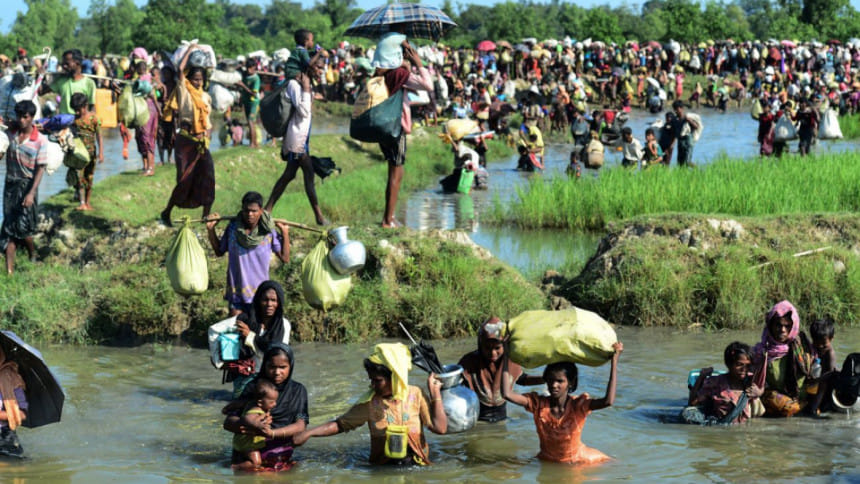Rohingya Windrush?

All hell broke loose over the British government! It found itself in the eye of a storm following a self- inflicted controversy raging over what is called the "Windrush generation". "Windrush" is the name of a ship that had brought thousands of Caribbean people to Great Britain in 1948 to help rebuild the war-ravaged country.
They are estimated to be 50,000 spanning two generations now. But the once welcomed Caribbean migrants who lived in Britain and worked since the country's "stern" hour of need (to slightly rephrase a post-War Churchillian expression) are in thrall to the host asking them to prove their bona fides after seven decades of residence! Haven't they overstayed their hospitality? Or else why would something put away on the shelf as a closed matter be reopened as a bolt from the blue!
Indeed the Caribbean immigrants who had come to suit a British need should have been naturalised citizens as a matter of course, pursuant to international norms, let alone in grateful acknowledgement of their post-war service to Britain. But in an unkind twist to the tale, they were asked to provide documentary evidence of their residence since their arrival in the UK. The documentation required submission of school or educational certificates, work place details, tax returns—just anything evidentiary to prove their continuous residence. On the face of it, this may look innocuous except for the very long time intervening. The difficulty of procuring the documents lies in the long chronology of seven decades interspersed with visits to Caribbean homes, apart from changes in their personal circumstances from time to time.
It is put down by the Opposition and the liberals generally to the hostile environment at the Home Office under the restrictive immigration policy of Theresa May's government.
The bubble-burst couldn't have happened at a more embarrassing time for the British government. The exposure may have ruffled the feathers of a host spreading its wings over the 50 Commonwealth Heads of State and Government Meeting that was in session in London.
As if that was not enough, it had a knock-on effect on EU citizens in UK who were already worried about their future in Britain after Brexit. The nettling of the Caribbean migrants with a fresh documentation requirement etches a frown on the EU residents' forehead.
Actually, the episode has been going on for two years before it blew up on the face of the authorities—top ministers are having to hold down their heads in shame because of the absurd levels to which the demand for documentation was foisted on the individuals. Apologies are being offered but are not considered enough to assuage the rather hurt British sensibilities.
Self-evidently, there can't be any parallels between the British handling of the Caribbean and Myanmar's treatment of the Rohingyas. The former is a belated consular issue, at worst with a step-motherly racist tinge to it involving maybe deportation of some out of Britain. Even that would be an unacceptably cruel act. And, it has already touched British sensibilities raising a hope for a mellowing policy towards the Caribbean community.
By sharp contrast, the Rohingya crisis in terms of calibration, intensity, escalation and newer ramifications constitutes the vilest form of wholesale ethnic cleansing to-date. And, the continuing disdainful defiance of world opinion, international law and standard inter-state code of conduct by the Myanmar regime makes a mockery of the powers that have the levers with Myanmar to din good sense into its ears.
Even after six months of signing a repatriation accord with Myanmar not a single family has been repatriated from Bangladesh. This is noted with serious concern by the EU, especially in view of the onset of the rainy season fraught with the dangers of landslides, let alone the muddied and lethally disease-harbouring living conditions.
The arbitrary drawing up of a list of the so-called ethnic nationalities leaving out the Rohingyas altogether whose ancestors had lived in Arakan, the present-day Rakhine state for centuries may be taken up at the appropriate international level for an authentic determination of the truth. This can be a precursor to taking up the dual issue of genocide and ethnic cleansing by the Myanmar regime before the International Court of Justice or to the International Criminal Court. So what if they are not signatories to the institutions, does it indemnify them against prosecution for crimes against humanity by the most lenient of interpretations?
A reading of history tells you in unmistakable terms that as late as the 10th Century the ethnic Burmese didn't set their foot on the Rakhine, meaning that other ethnic groups had been pre-existing in the area. This is corroborated by a book titled, "A Comprehensive Vocabulary of the Languages Spoken in Burma Empire," written by Scottish Physician Francis Buchanan in 1799. He referred to "a proof of the term 'Rooinga' being in use in the area well before the British consolidated their rule" in 1823 through the Anglo-Burmese war. Buchannan further asserts that the first dialect spoken in the Burman empire was derived from an Indian language spoken by Mohammedans who have long settled in Arakan and are known as "Roonga" or the nation of Arakan.
How long then will Myanmar hoodwink the world with its prevarications and bland lies?
Shah Husain Imam is adjunct faculty at East West University, a commentator on current affairs and former Associate Editor, The Daily Star.
Email: [email protected]

 For all latest news, follow The Daily Star's Google News channel.
For all latest news, follow The Daily Star's Google News channel. 



Comments